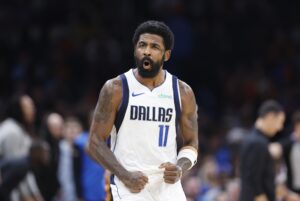For the past few years, it seems that every season the NBA’s Most Valuable Player Award is widely disputed. Some people value statistics, others value team records, and some take the MVP award literally. This last group thinks the truly most valuable player deserves the award. So which is it? What is the most important factor when it comes to the MVP award?
What’s Wrong with the NBA’s MVP Award?
The biggest issue with the award is the lack of clarity. With the other awards, they have pretty clear definitions. Rookie of the Year goes to the best first-year player, determined statistically. Sixth Man of the Year goes to the best player off the bench, usually the highest bench scorer. Defensive Player of the Year goes to the best defensive player, that’s as easy as it gets.
Most Valuable Player is the only one that does not quite mean what it says. Because the award does not always go to the truly most valuable player. For example, in 2011 the MVP winner was Derrick Rose. He was not the most valuable player since the Chicago Bulls were only two points worse per 100 possessions with Rose off the floor and a positive six overall.
While Dwight Howard on the other hand was truly the most valuable player. When he was on the court the Orlando Magic were a plus eight per 100 possessions while they were a negative one with Howard off the court.
So since it is not actually based on value, the award name becomes confusing and leads to debates every season where people choose different sides because they do not share the same criteria.
What are the most common criteria?
Most MVP awards are won by having a combination of a few things. First, and arguably the most important, is having a top-three seed in your conference. Preferably top-two but being a third seed works as well. If the team is not in the top three the MVP odds shoot way down. Since the inception of the MVP award, there have been 65 winners and only five times has the award winner not been on a top-three seed in their conference.
Another important key is to have great statistics. Simply being a great player on a winning team is not necessarily going to be enough. The best team in the league at the moment is the Utah Jazz, but no Jazz players are getting any MVP consideration because none of them have the stats to back up their case.
Over the past 50 years only two players have won the MVP award averaging under 20 points per game: Steve Nash and Bill Walton.
The final key criteria is also the most random one; the narrative. This can change drastically from year to year but people love a good story. This most often helps players who have never won an MVP before since it is “new and fresh.” Voters get voter fatigue quite easily which is why only three players have ever won three-straight MVP awards.
Without voter fatigue, Giannis Antetokounmpo would have a great case for MVP right now but because he already won it the past two seasons and is having a worse year than last season, his MVP odds are low.
Sometimes the narrative happens to favor a player who is on an elite team and is putting up great stats, but other times the award ends up going to players who probably didn’t deserve the award based on how the votes usually go.
So what is the problem with the NBA’s MVP Award?
The issue here is that people will not agree on criteria. So every season a bunch of names get brought up and everyone will clamor for their favorite player to win the award when that is clearly not how it works. No matter how great your stats are or how valuable you are to your team, if they are not one of the top three seeds do not expect the said player to win MVP.
Stephen Curry and Nikola Jokic this season have both been putting up absurd numbers and carrying their mediocre teams to the playoffs. However, they are not even close to a top-three seed, so fans of the Denver Nuggets or Golden State Warriors should realize that these two won’t win MVP.
LeBron James of the Los Angeles Lakers has been putting up good numbers but nothing crazy. Despite that, he is getting most of the MVP consideration because the Lakers have the second-best record in the league.
You don’t have to agree with this system. You don’t have to like this system. But you need to accept that this is how the MVP award works. It is not actually about “value” despite the misleading name. The criteria do not and should not change every season to fit the needs of whoever your favorite player is.
Main Photo:
Embed from Getty Images






